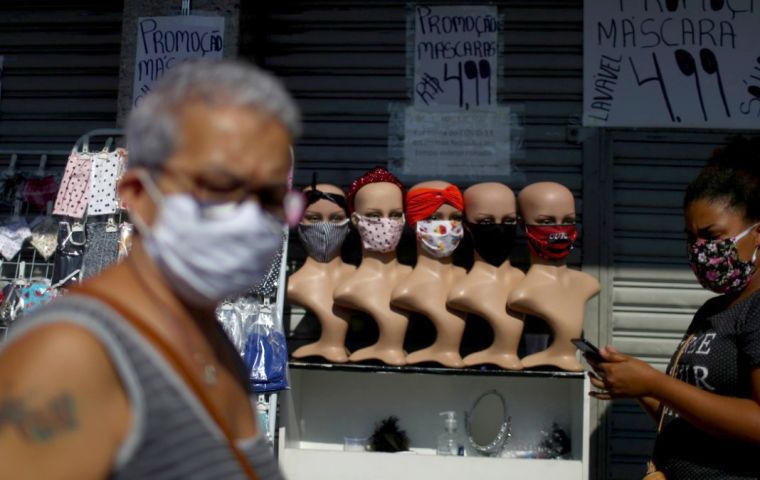MercoPress. South Atlantic News Agency
Bolsonaro's erratic administration keeps Brazilian corporations from issuing fresh bonds
 Rising country risk and extreme currency volatility leading to a 30% Real devaluation this year have sharply affected yield on Brazilian companies’ debt
Rising country risk and extreme currency volatility leading to a 30% Real devaluation this year have sharply affected yield on Brazilian companies’ debt As Brazilian President Jair Bolsonaro kept his name in the headlines over the last weeks by firing ministers and attacking governors, the Supreme Court and Congress, investors fretted over the prospect of a political crisis on top of the coronavirus pandemic.
Rising country risk and extreme currency volatility leading to a 30% Real devaluation so far this year have sharply affected yield on Brazilian companies’ debt, making it more expensive to issue bonds abroad.
In its May 5 report changing Brazil’s rating outlook to negative from neutral, Fitch Ratings cited the “volatile relationship between the executive and congress” among factors.
Brazilian country risk surged 209 basis points this year, or 120%, to 385 basis points over the U.S treasury notes yield, according to Refinitiv’s IFR data. Mexico’s risk rose 199 basis points, to 348. Chile’s country risk rose 99 basis points to 174.
As the regional impact of the novel coronavirus pandemic mounts, other Latin American countries tapped markets. In April, total Latin American issuance quadrupled to US$16.5 billion, as governments and companies rushed to strengthen cash cushions against the outbreak. Chile, Mexico, Guatemala, Paraguay, Panama and Peru issued sovereign bonds even with higher costs.
Among corporations that sold dollar or euro denominated bonds are Mexico’s America Movil, Chile’s Codelco and Colombia’s Ecopetrol SA.
Brazil’s largest corporations, including steelmakers, miners, pulp and paper producers, meatpackers and the country´s largest banks, have been resisting issuing bonds and paying more.
“The political turmoil clouds the perspective for recovery”, said Soummo Mukherjee, senior analyst at Lucror Analytics. He believed investigations against the president and the threat of an impeachment process worsen the effectiveness of the country’s response to the pandemic.
“Brazilian Treasury and corporations are resisting higher rates”, said a senior banker at a large U.S. bank.
Another banker said Brazilian companies are “in denial” and may miss the opportunity, since no one knows the long-term impact of the pandemic on the companies’ cash flow.
Brazilian issuers saw its bond yields on the secondary market rise by up to 600 basis points in early April, when the political crisis began. Some of the additional yield retreated.




Top Comments
Disclaimer & comment rulesCommenting for this story is now closed.
If you have a Facebook account, become a fan and comment on our Facebook Page!